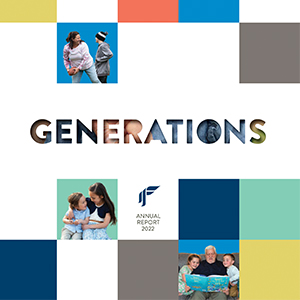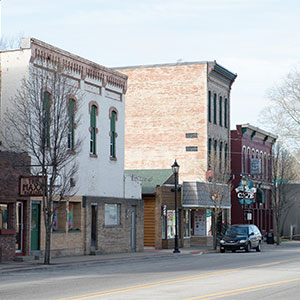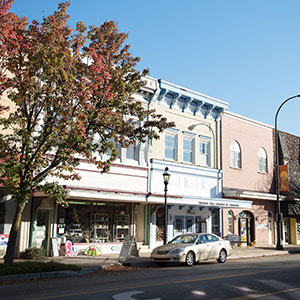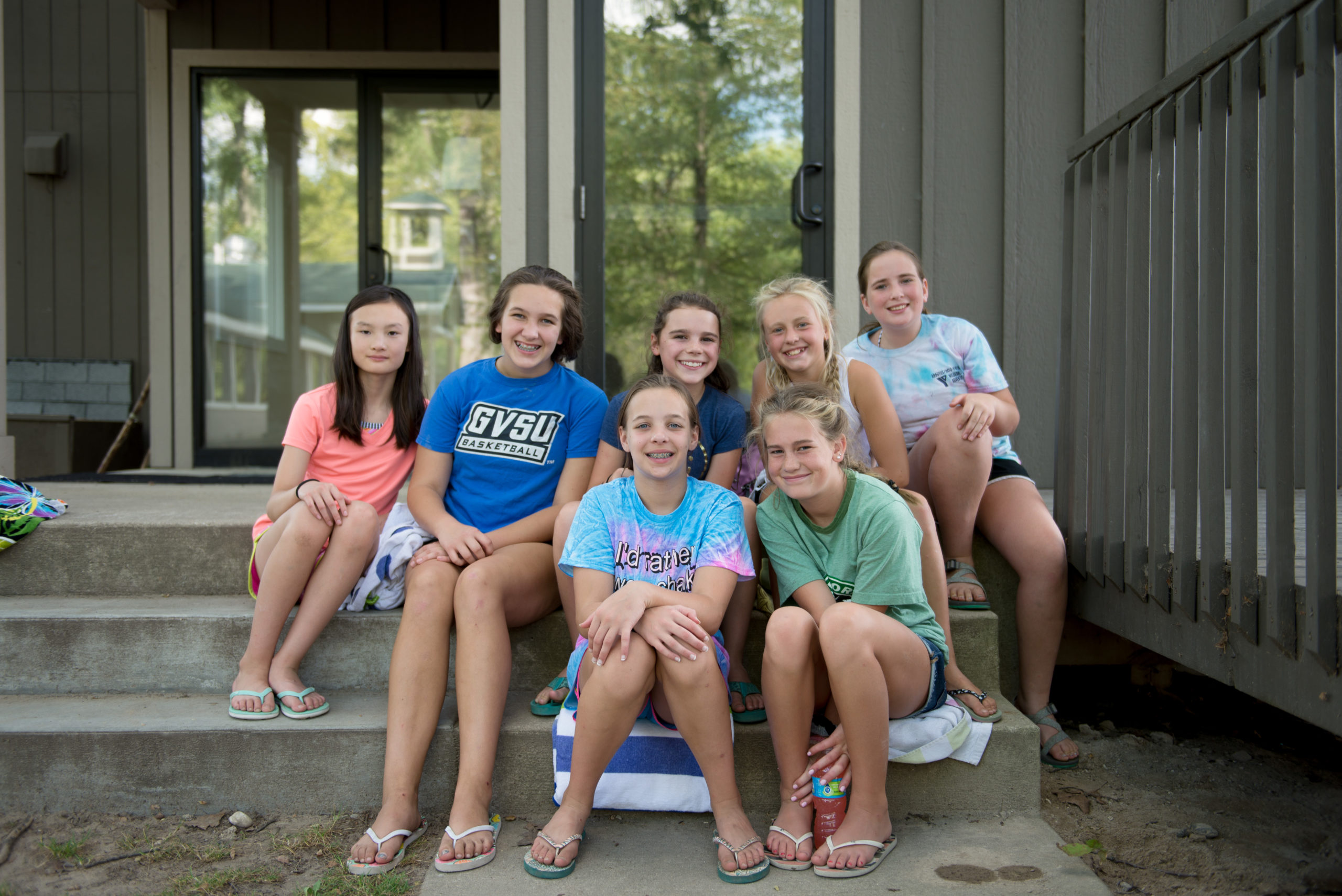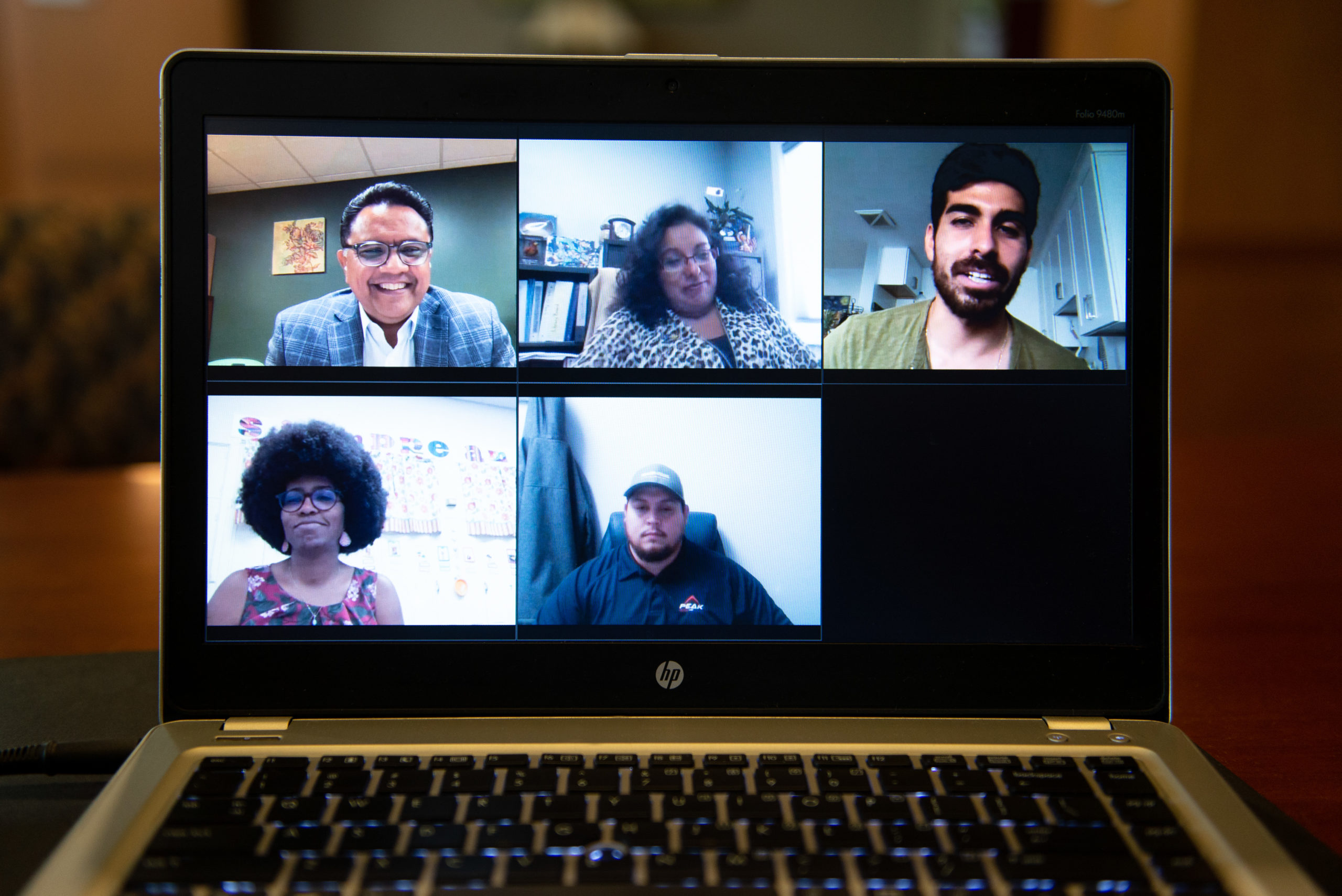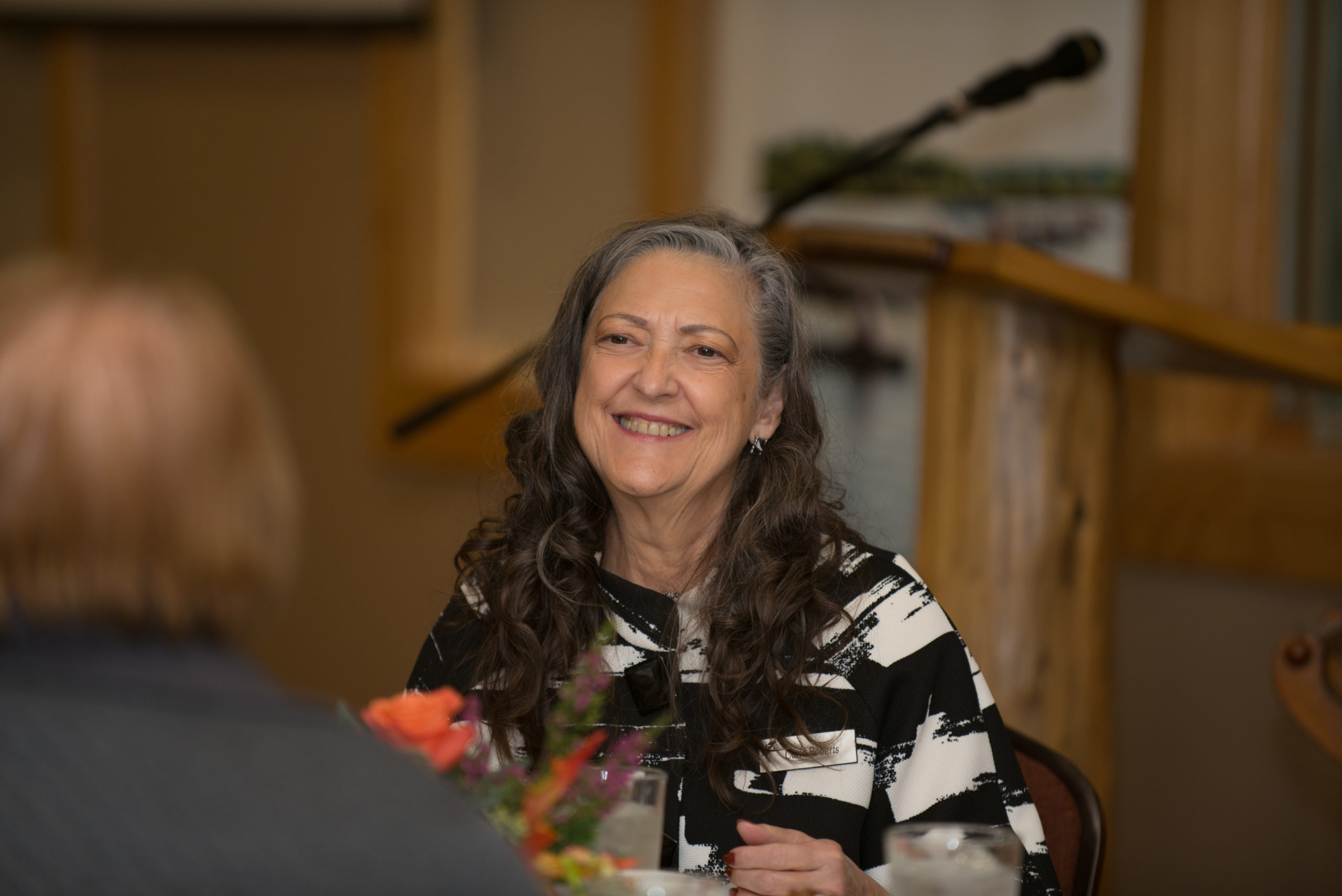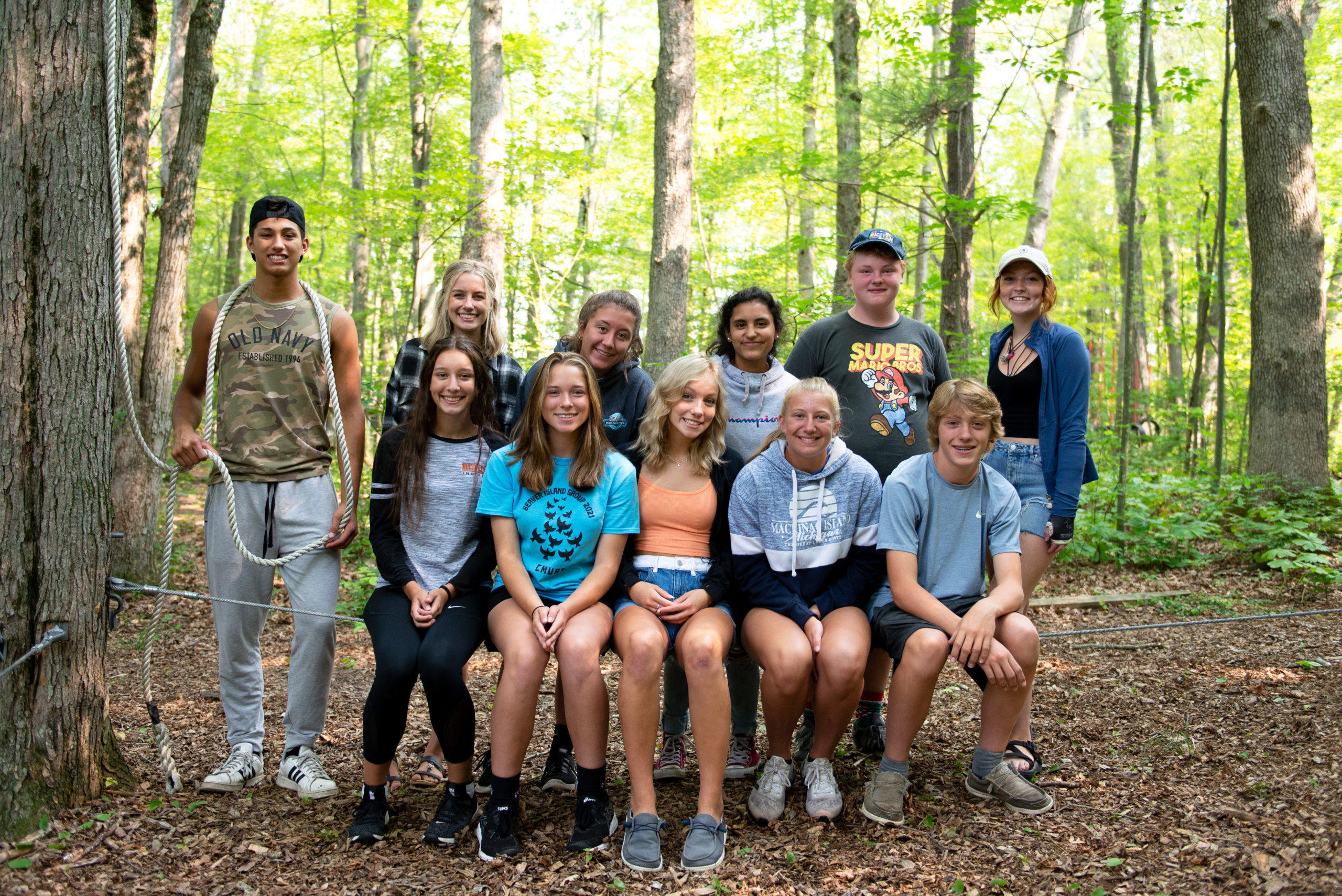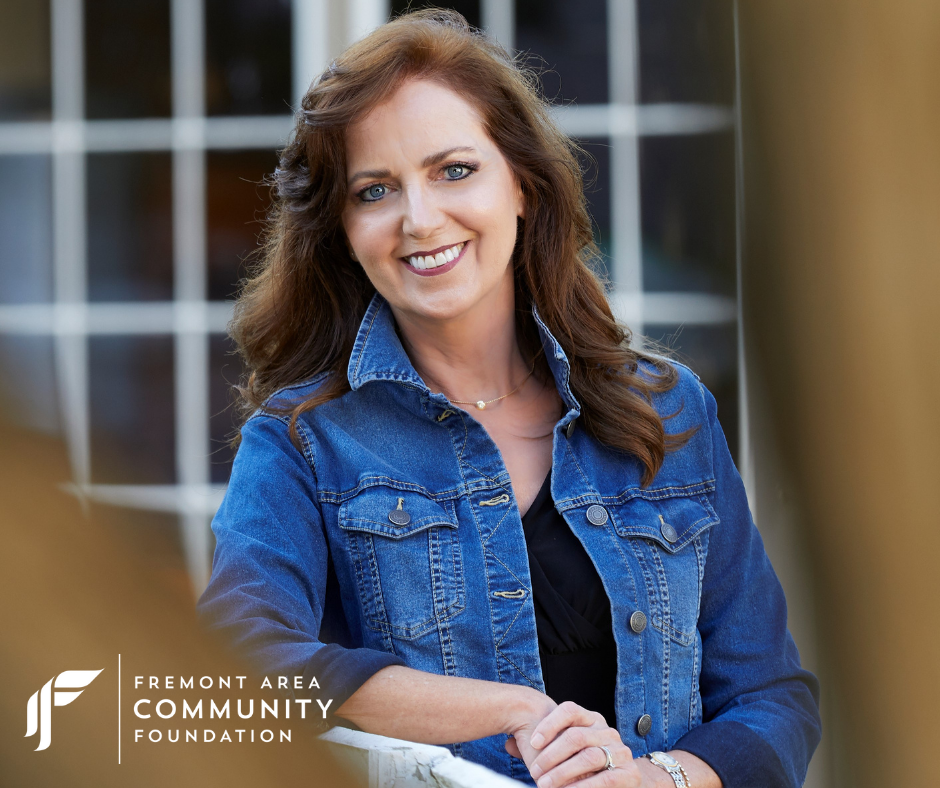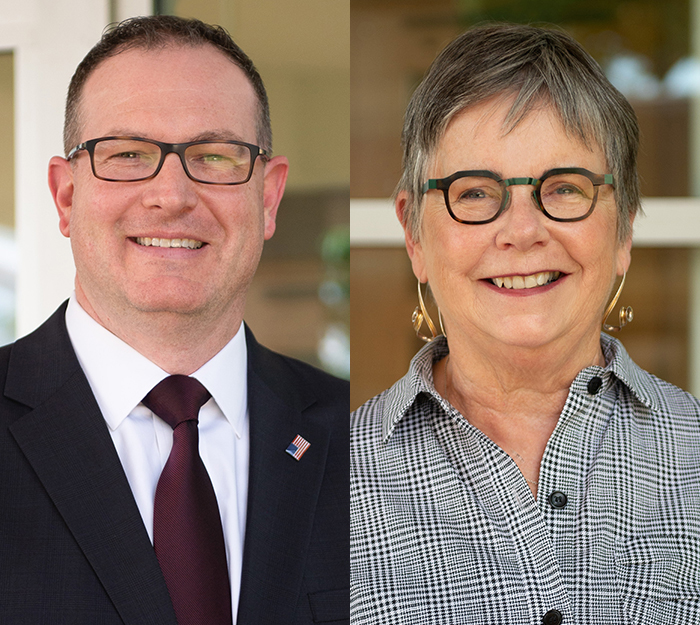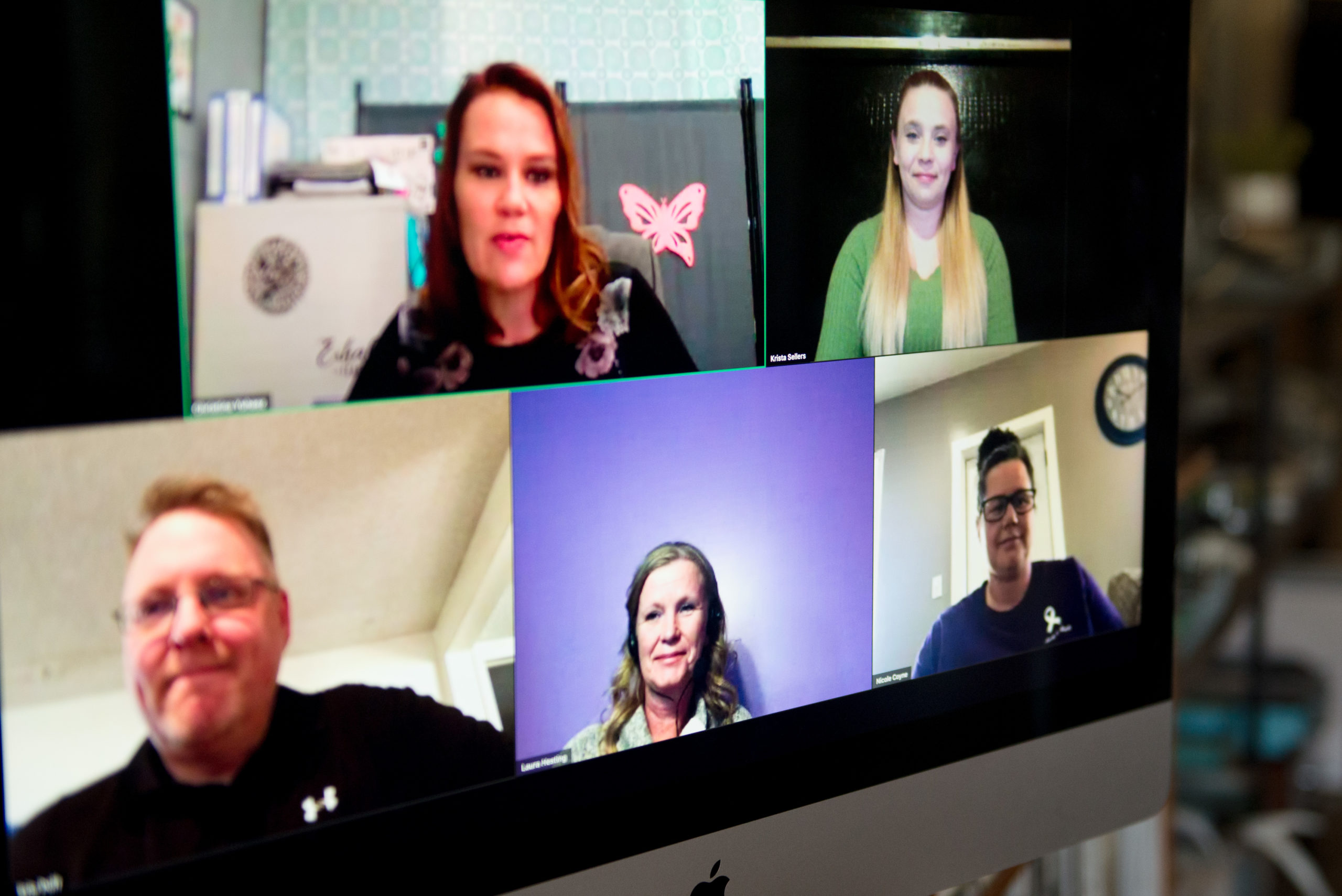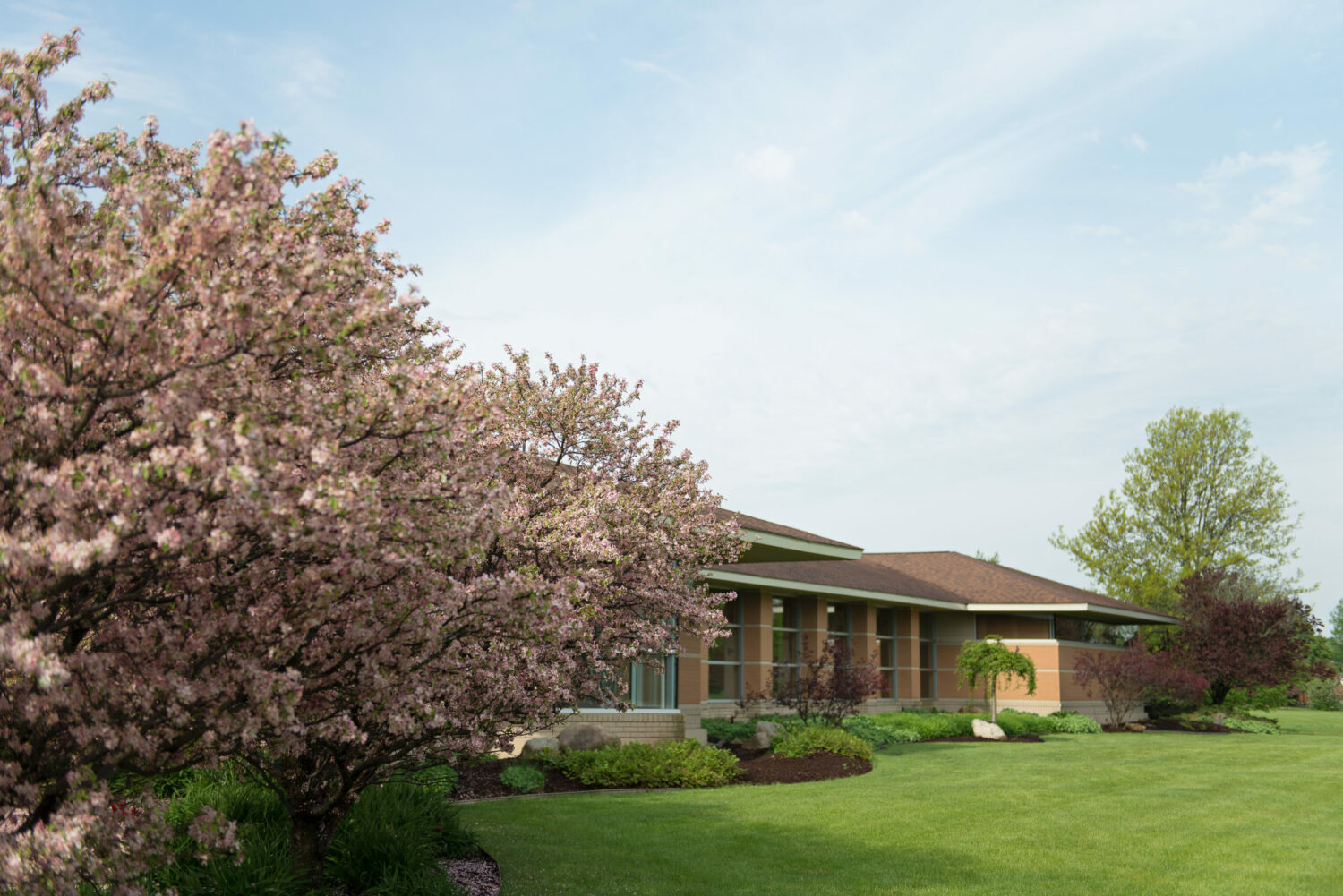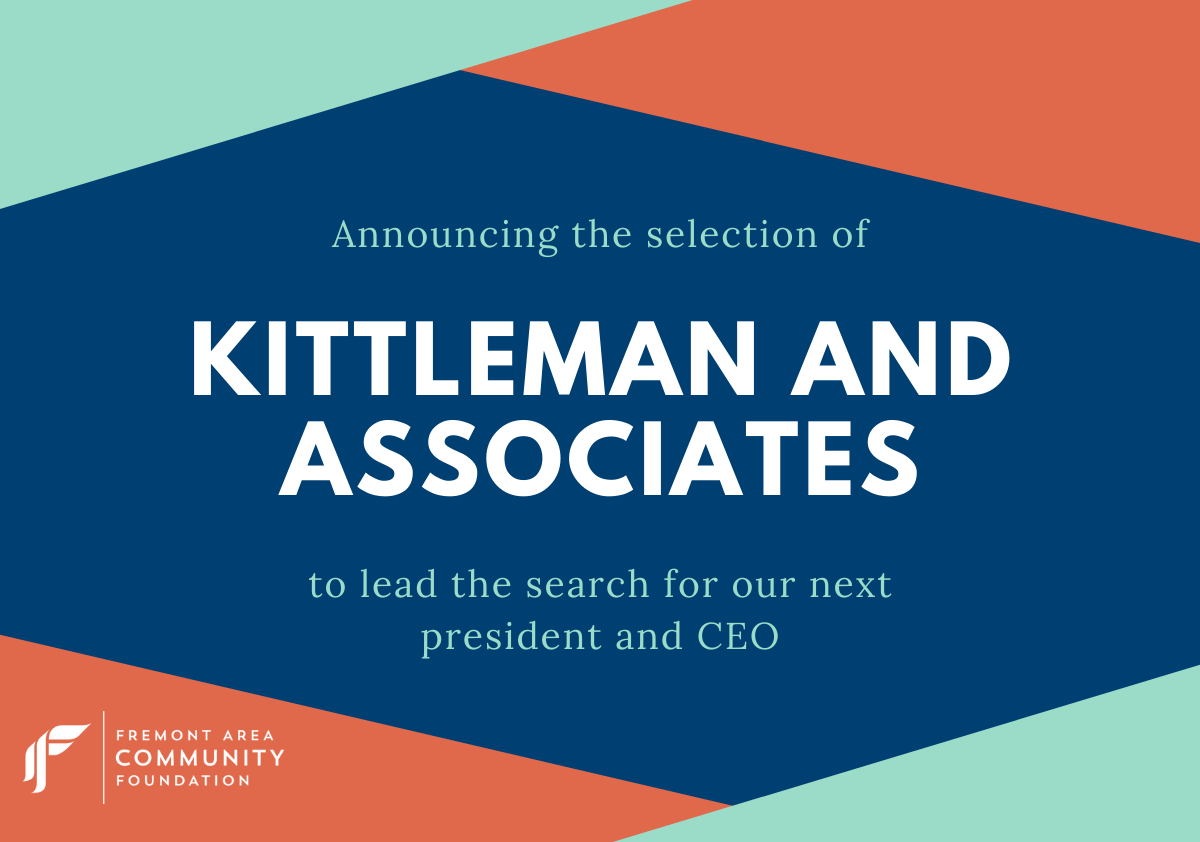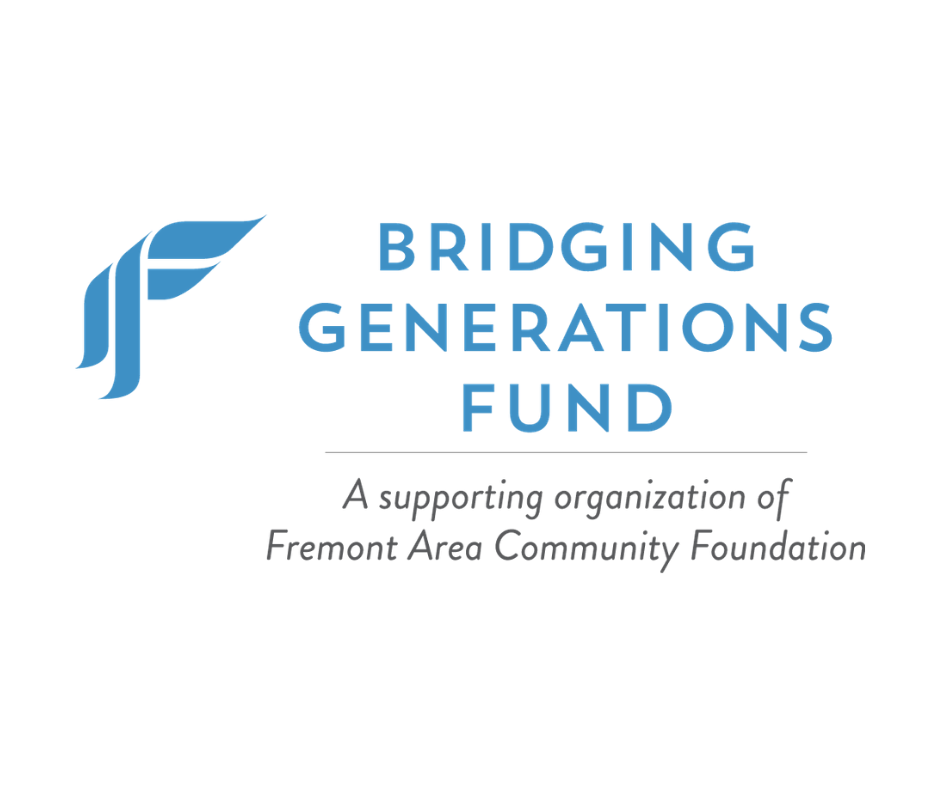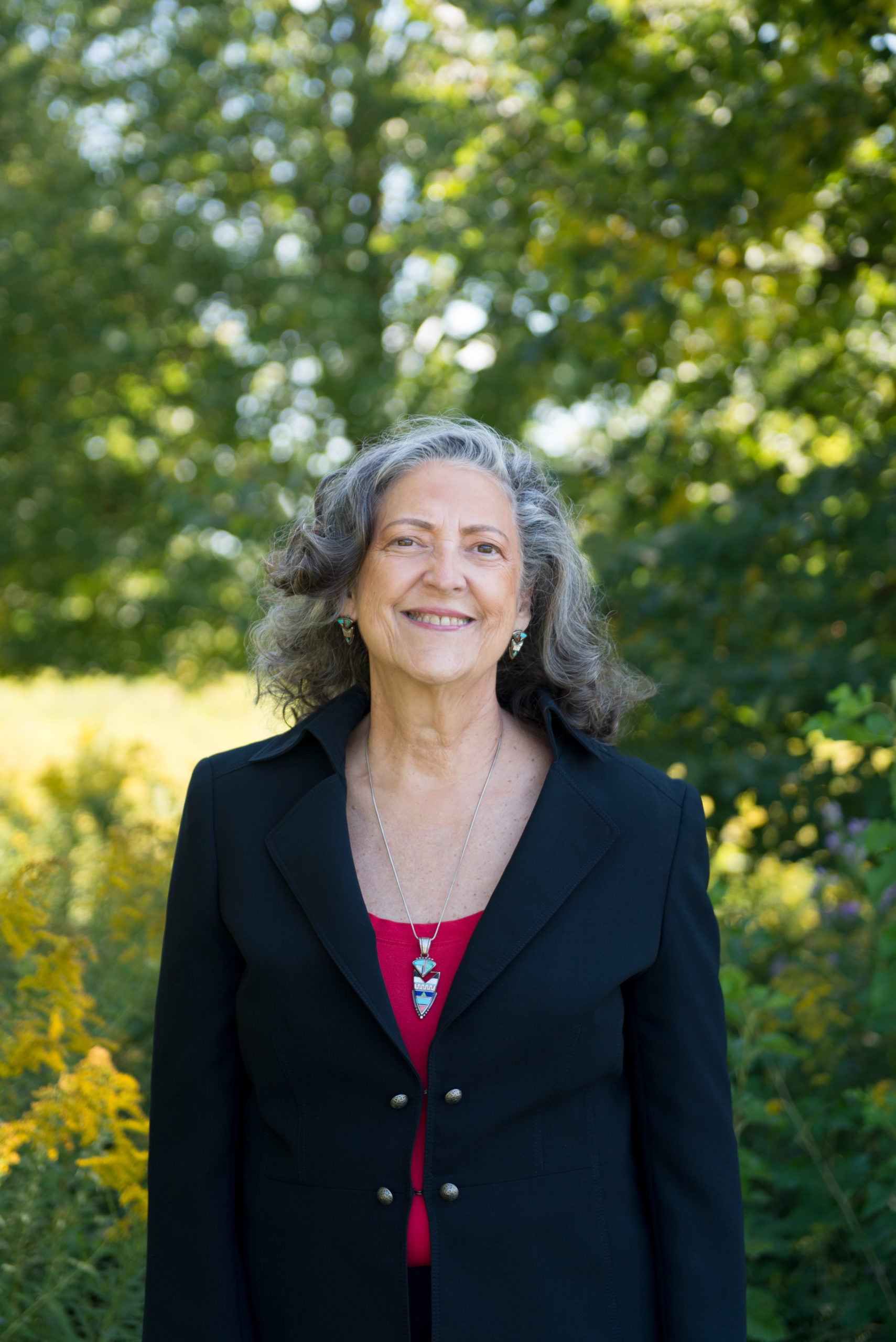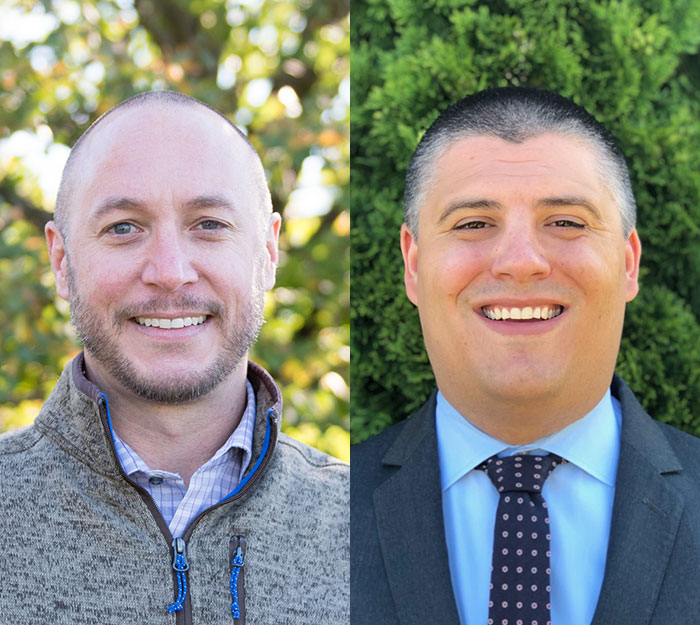As a community foundation, our past, present, and future are knit together by generations of generosity. Our latest annual report explores examples of the people, stories, and dreams that have built our Community Foundation over the last seven decades. Click here to read the full report.
Author: Patti Wheater
Fremont Area Community Foundation recently expanded their small business loan program through Michigan State University Federal Credit Union (MSUFCU) to support businesses in Newaygo, Lake, Mecosta, and Osceola counties.
The Community Foundation created the Small Business Recovery Loan Program with MSUFCU in 2020 to help small businesses in Newaygo County impacted by the pandemic. Now, the Community Foundation is broadening that assistance to business start-ups and expansions as well as pandemic-related needs. Loans will also be available to businesses in the counties served by the Community Foundation’s three affiliate foundations.
“Local small businesses are crucial to the economy in our region,” said Shelly Kasprzycki, Community Foundation president and CEO. “Through our partnership with MSUFCU, we are excited to increase our support of local businesses.”
“MSUFCU recognizes the role small businesses play in communities—they create opportunities, energize the economic base, and cultivate a spirit of entrepreneurialism,” said April Clobes, president and CEO of MSUFCU. “We are pleased to partner with Fremont Area Community Foundation to provide small businesses access to affordable financing through this program.”
Through the partnership with MSUFCU, loans of up to $50,000 are available at a low interest rate. For-profit and nonprofit businesses with 50 or fewer full-time employees are eligible to apply. The business must be headquartered in Lake, Mecosta, Newaygo, or Osceola counties.
To inquire about eligibility, start the application process, or get more information, contact Maria E. Gonzalez.
Dear friends,
As spring fully blooms, I am reminded of the promise of young people as I see them plan for prom, summer jobs, and graduation. So many hopes and dreams are on the precipice of reality. And thus, the Community Foundation plays an important role by investing in young lives. We have opened over 2,400 Kickstart to Career savings accounts and, last year, we awarded scholarships to more than 350 students and funded more than $1.8 million in education-related grants.
I am troubled when I hear the derogatory term “snowflake” to describe youth as lazy, protected, and entitled. What I see here in Newaygo County are hardworking kids—children that need our loving guidance and just enough freedom to develop their own minds and sense of self. Our young citizens will be the leaders of the future and the workforce to keep our economy growing. They will guide family values. I hope they will also be able to break the cycle of contempt for our fellow people and find real solutions to long-term problems.
If you need an example of the tenacity, creativity, and leadership of young people, take a look at our Youth Advisory Committee. They engage in grantmaking, leadership, volunteerism, and building friendships across school boundaries, socioeconomic status, and geography. The world today is a complicated place with criticism often overriding compassion, but I am heartened to see these students’ commitment to making the world around them better.
We’re proud to partner with you to help young people through opportunities like Kickstart to Career, scholarships, and more. Kids are doing so much more than we realize in sometimes very challenging circumstances. Hope shines eternal!
Fremont Area Community Foundation is expanding a partnership with Northern Initiatives to provide loans and technical assistance for small businesses in Newaygo, Lake, Mecosta, and Osceola counties. The expansion allows the Community Foundation to support local businesses in the areas served by their three affiliate foundations as well as in Newaygo County.
Loans are available to entrepreneurs and businesses looking to start or grow their business in the four-county region. Loan recipients also have access to a variety of trainings, tools, coaching, and other supports. They can work one-on-one with a coach as well as access Northern Initiative’s online business resource portal, Initiate.
“Local small businesses are the backbone of the economy in our region,” said Shelly Kasprzycki, Community Foundation president and CEO. “We have been proud to partner with Northern Initiatives in Newaygo County over the last several years and are excited to support this expansion of their services here and in Lake, Mecosta, and Osceola counties.”
“We help entrepreneurs who have been overlooked or denied by other financial institutions and give them the support they need to start and grow their businesses,” said Elissa Sangalli, president of Northern Initiatives. “Those businesses go on to support families, neighborhoods, and communities.”
The Community Foundation has partnered with Northern Initiatives—a nonprofit Community Development Financial Institution (CDFI)—since 2016 to create a regional revolving loan fund to serve businesses who may not quality for traditional funding. In 2021, Northern Initiatives facilitated more than $475,000 in loans to Newaygo County businesses.
Interested businesses can apply directly through Northern Initiatives. Learn more at northerninitiatives.org.
On February 24, the Community Foundation hosted its fifth Stronger Together Series virtual event with a conversation on the experiences of local women in the workforce and during the pandemic.
Shelly Kasprzycki, Community Foundation president and CEO, welcomed the audience and introduced the evening’s moderator, Dr. Jennifer Drake, dean of the College of Liberal Arts and Sciences at Grand Valley State University.
Drake began by sharing findings from the 2021 Women in the Michigan Workforce report. The report found that between February and December 2020, approximately 136,000 Michigan women left the workforce and that women working full-time make about 78 cents on the dollar compared to men working full-time. In more encouraging news, Drake noted that a Pew Research Center report found women have made significant educational gains, with higher rates of college enrollment and degree completion than men.
Along with Drake, the evening’s panel included Julie Burrell, Newaygo County’s economic development director through The Right Place; Carolyn Hummel, retired educator and the first female principal of Fremont Middle School; and Melissa Dykman, Newaygo County Probate Court Judge.
When asked how their identity as women shaped expectations others had of them, Hummel talked about being the only girl in her advanced math class in high school. “My friends said, ‘Math is just too hard for girls,’” she remembered.
Other panelists commented that pressure often comes from within. “The pressure really comes from me,” said Burrell. “I definitely put pressure on myself to wear all the hats and do all the things.”
When asked about barriers they have faced, Hummel talked about being denied a promotion after asking why a male coworker with less experience was making more than she was.
“At that time, by asking that question, I was blacklisted,” said Hummel. “I realize now if it hadn’t been for that, I would never have gotten my dream job, but it was a little traumatizing at first.”
Panelists also spoke about the experiences and people who have helped them grow. Burrell mentioned the importance of finding an ally. “Whether you call it mentorship, allyship—I think it’s really helpful for anyone in their career, but especially women,” she said. “You need to have people in your corner.”
Dykman talked about the importance of growing up with parents who “believed there was nothing a boy could do that their daughters couldn’t.” She also shared that she is grateful to have built her career in Newaygo County, “where I had great people to work with.” Dykman said that the lawyers and judges she interacted with “never treated me any differently. They were all invested in me being the best I could be and teaching me.”
During a time for questions at the end of the event, the panelists emphasized the importance of women encouraging other women.
“It’s important to identify those women you see who are up-and-coming and embrace them and be their advocate,” said Burrell.
Dykman added, “It goes back to something like today’s event. Having these discussions and hearing from multiple generations not only helps us understand where we’re at and what we need to do to improve but also where we can from. People like Carolyn made it easier for me, and I can make it easier for those coming up.”
Stronger Together is a series of events designed to look at differences, identity, and the stories that shape our lives. More information on the series—including recordings of past events—can be found at facommunityfoundation.org/stronger-together.
The Community Foundation awarded $3.3 million in its second community grant round of 2021, bringing the total awarded in both rounds in 2021 to nearly $5.6 million.
Grant support was awarded to a variety of organizations serving Newaygo County residents, including programs addressing economic development, college and career access, housing, literacy, and more. Most grant awards concentrated on the Community Foundation’s three focus areas of community and economic development, education, and poverty to prosperity.
More than 50 grants were awarded in total, including a $100,000 grant to Newaygo County for recycling services, continuing the Community Foundation’s long history of supporting recycling. Another grant for $133,000 was awarded to Newaygo County Regional Educational Service Agency (NC RESA) to support WE CAN! Newaygo County and the Newaygo County Area Promise Zone. Both NC RESA programs work to increase access to post-secondary education and training as well as help address barriers to success for local students.
Several local youth camps were also awarded grants to support summer camp scholarships. These scholarships help to cover the cost of a camp experience for local children who may have difficulty affording it otherwise. Scholarships typically cover 75 percent of camp registration.
The Community Foundation accepts community grant applications online twice each year. Applications for the first grant round of 2022 are due on March 1.
View a full list of grants awarded, as well as information on how to apply for a grant, at facommunityfoundation.org/grants.
Dear friends:
As we begin a new year, I enjoy the task of preparing a new notebook, full of possibilities, ideas, tasks, and plans. I am reminded of the words of songwriter Brad Paisley, “Tomorrow is the first blank page of a 365-page book.” Together, I want our community to write an excellent 2022 book.
We are kicking off 2022 following a banner year for grantmaking and investments. Changes in leadership took place, and our team feels stronger than ever. Change can be difficult, but the Community Foundation team rose to the challenge, and Newaygo County residents couldn’t have been more welcoming to me.
Coming in 2022, we anticipate enhancing our community investments through strengthened grant processes and refreshed community partnerships. I appreciate all the visits I’ve had with residents and look forward to many more. The legacy of past donors and involvement of current donors has funded many programs supporting the reduction of poverty, our vibrant arts and cultural community, preservation of history, literacy, youth development, recycling, economic development work, and scholarships. The breadth and depth of the grants awarded is amazing, and we are grateful to you for being a part of it.
Though the past two years have been difficult, I believe this community has great assets and, together, we can overcome the challenges we face with real solutions, one step at a time. Our Board of Trustees and staff will look at our lessons learned and update our strategic plan and how we implement grants, partnerships, and work with donors.
Thank you for being a part of our Community Foundation, and we look forward to sharing exciting updates this year.
On September 30, Fremont Area Community Foundation hosted its fourth Stronger Together Series virtual event with a conversation exploring what it means to be Hispanic/Latinx in Newaygo County.
Carla Roberts welcomed the audience for her last Community Foundation event before her retirement as president and CEO on October 1. She explained the goals of the overall series, including amplifying marginalized or overlooked voices and exploring the ways differences enhance our community. Roberts also shared that the evening was focused on creating a safe space for honest conversations and encouraging all of us to grapple with misconceptions and consider new perspectives.
“Hispanic/Latinx represents the second largest ethnic group in our county, but what does it mean to be of Spanish-speaking descent in an English-speaking area?” asked Roberts. “What does it mean to have a foot in two different cultures? And what misconceptions prevent our neighbors from feeling like they truly belong?”
The moderator for the evening was Carlos Sanchez. Born in Mexico City, Sanchez is the director of the Latino Business and Economic Development Center at Ferris State University and active in many organizations and projects in West Michigan.
“I’m excited just to share the stories we’re going to hear,” said Sanchez. “The folks that are invited to this panel are going to share their personal stories, and it’s not easy to share them. I hope the people who are watching right now gain knowledge, first of all, but also empathy for their stories.”
The panel included Laura Rodriguez, director of the Croton Township Library; her son Benancio Rodriguez, currently a PhD student at UCLA; Juan Ochoa, owner of Peak Heating and Cooling; and Carolina Heredia-Contreras, a kindergarten teacher in Fremont Christian School’s Spanish immersion program.
Sanchez began the discussion by asking panelists what it’s like to be Hispanic/Latinx in Newaygo County, while noting that “just like other cultures or other groups, Latinos are not monolithic. Our experiences are different.”
Most panelists mentioned “ups and downs” and experiencing moments of feeling different or like an outsider, although that perception has shifted over the years.
“We’re definitely the minority here in Newaygo County,” said Ochoa. “I always felt like I was an outsider but over the years, I’ve seen a big transition. Is it perfect? No, but there has been a change and I can feel it.”
Benancio Rodriguez mentioned that when he was treated differently, he could also look to others who experience similar situations for support. “It stings that there’s times you’re treated differently but at other times, because you’re not alone, you’re able to find a community within that,” he said.
When discussing common misconceptions, Heredia-Contreras—who comes from the Dominican Republic—noted that “Some people think all Hispanic people are from Mexico or that all the food we eat is Mexican food.” She said that while people here may initially have misconceptions about her culture, they have been welcoming and eager to learn more.
Ochoa mentioned that another misconception is that “just because you look Latino or Mexican doesn’t mean you speak Spanish.” While he learned English in elementary school in Grant, some other panelists spoke mainly English at home and learned or re-learned Spanish later.
Panelists also spoke about the value in listening to the stories of others without assumptions and the importance of addressing misconceptions or prejudice when you hear them.
Calmly bringing offensive comments to someone’s attention “is the way we eventually learn and grown,” said Benancio Rodriguez. “We teach each other how to be a little more respectful.”
Sanchez shared that he believes the difficult experiences of our society over the last two years have helped encourage more people to have important conversations like these.
“People are more willing to respond, more willing to stand up, more willing to say something,” said Sanchez. “So now we find allies. It’s not ok anymore to stand on the sidelines. We have to address it in the best way possible.”
Stronger Together is a series of events designed to look at differences, identity, and the stories that shape our lives. As future events in the series are announced, information can be found on the Community Foundation’s social media channels (@FremontAreaCF) and on its website. The website also features recordings and other resources from past events in the series.
At the end of September, our President and CEO Carla Roberts will retire after 10 years leading Fremont Area Community Foundation. Recently, we sat down with Carla as she reflected on her decade with the Community Foundation, what she is most proud of, what she will miss, and more.
As you think back to when you started, what has surprised you about the Community Foundation or Newaygo County?
Carla: Newaygo County has changed a lot in the last 10 years and one of the most salient examples is if you look at the Newaygo County Tourism Council. Everything about how they present the county on the web and in the publications, the things you can go do, the summer top 10 list—it is amazing to me how far that has come in the period of time I’ve been here.
We know anecdotally that now parents are much more engaged with wanting to see their students go on to post-secondary training. That starts with kindergarten through Kickstart to Career and, of course, all the work with WE CAN! Newaygo County and the Promise Zone. All of that has been put into place in the last 10 years. There’s a different climate than there was and a different kind of talk on the street than there used to be.
What are your proudest accomplishments over the last 10 years?
I would say our staff team is one of the things I’m most proud of. We have a good group of people who work well together and who are smart. I’m very, very proud of the team that we have created and know that this team will continue to do good work in the future.
What will you miss about this work?
I’m going to miss all the people I work with every day. I’m going to miss sitting here watching the prairie go from season to season. It’s a very peaceful place to work.
I’m going to miss the sense of achievement, of doing big things. The work here is very much oriented to building the best community that can exist. The levers of education, economic development, and reducing poverty I know in my heart are the right levers for achieving the best possible economy, and that’s what improves the quality of life. That’s what makes it a good place to live—when everyone is doing well.
We’re not there yet because these are long-term things. Then, when you’ve got big waves of activity like we had with the multi-pronged crisis last year, it feels like it washes away everything you’ve done. I know it hasn’t, but it feels like that at first. You just keep going. It’s like the stock market: it goes up and down but over time it should have an upward trajectory. When you do social change work, it’s the same thing. There are going to be setbacks, but you’re looking for a long-term trajectory toward betterment. If you’re achieving that, then that’s what you want to do and that’s the most you can do.
What are some of the biggest things you’ve learned along the way?
I have learned so much in the last 10 years! My biggest personal growth and professional development has come from the staff. Everybody here has taught me something. Every single person has opened my eyes to a new way of seeing something about life. I appreciate all of them so much.
I also learned how to put together a theory of change. I can’t say I had deep experience with that before. It certainly took us a long time to shuffle the pieces and figure out how it would fit together in a way that would make sense, not only to us but to our grantees and to other people in the community. And I think we landed on it.
What are you looking forward to?
I’m looking forward to removing the clutter from my house. That’s what I want to do first. I actually want to simplify my life a bit.
I’ve been to every continent except Antarctica, and I would like to get the seventh continent in. That’s going to be hard, but can you imagine going down there and seeing penguins? Then I could say I’ve been to all seven continents in the world.
What are some favorite memories of your time here?
There’s a rhythm and a cycle to life and to the activities that happen in the communities, and it makes me smile just talking about it. And the parades! The parades in small towns are just so wonderful. I get the biggest kick out of those big pieces of farm equipment they bring out for parades. I’m going to look back and smile about that.
I always enjoyed trustee meetings because our trustees are so involved with the Community Foundation. They’re so engaged. They give a lot, especially this last year when they’ve been doing the [president and CEO] search.
[This job] has been the capstone of my career. That’s what I said I wanted it to be in my first interview with the board. It has been an opportunity to bring what I gained through a career in nonprofit work and in philanthropy into this place and try different things to see what might create real change for people and make improvements in the community. I’m really happy about that. I feel like my career is complete.
After 17 months of virtual meetings, our Youth Advisory Committee (YAC) kicked off a new school year with a teambuilding retreat at Camp Henry on August 4.
Returning YAC members spent the morning getting reacquainted and taking part in activities that emphasized teamwork, communication skills, and facing challenges creatively. Together, YAC members navigated a group tightrope walk, obstacle courses, and rode on a giant swing. The half-day retreat served as the official start of a new school year of activities for the group.
“This year, I’m most looking forward to meeting new people,” said Iris Herrera, an incoming junior from Newaygo who will also serve as this year’s YAC secretary. “Now that I’m a part of YAC’s executive team, I’m learning more in depth about what we do. Every year is a little different, and I’m looking forward to learning.”
YAC students meet once a month from September to May to learn more about philanthropy, nonprofit organizations, leadership, grantmaking, and more. Each March, students review grant requests for programs that impact local youth and recommend funding. In 2021, $62,500 was awarded to programs offering mentoring opportunities, outdoor recreation, mental health resources, and more for Newaygo County youth.
This year, YAC students will also continue to evaluate the results of their most recent Newaygo County youth needs assessment, which included a survey of more than 900 local high school students.
YAC typically includes 24 members and is made up of a student from each grade at each Newaygo County public high school as well as the homeschool community. Bringing together students from different grades and school districts allows for a diversity of perspectives on the committee and gives members the chance to get to know peers from other schools and towns.
YAC is currently looking for incoming ninth graders with leadership potential to join the committee for the 2021-2022 school year. Students entering ninth grade this fall at a Newaygo County high school—or who live in Newaygo County and homeschool—are eligible to apply. Potential applicants should be willing to attend all meetings, participate in occasional community service activities, and be responsible students with a positive attitude.
For more information about YAC or to apply, visit facommunityfoundation.org/yac.
Fremont Area Community Foundation’s Board of Trustees has selected Shelly Kasprzycki as the organization’s new president and CEO, effective September 27, 2021. Kasprzycki will succeed Carla Roberts, who will retire at the end of September after 10 years with the Community Foundation.
Kasprzycki, a lifelong Michigan resident, comes to the Community Foundation after most recently serving as president and CEO of Michigan Humanities. Prior to this position, she was executive director of Greater Jackson Habitat for Humanity and president and CEO of Jackson Community Foundation. Her career in nonprofit executive leadership and philanthropy has spanned the last 20 years.
“We are thrilled to welcome Shelly to the Community Foundation,” said Joe Roberson, FACF board chair and chair of the search committee. “She brings extensive experience in collaborative leadership, community outreach and engagement, and nonprofit best practices. We look forward to the ways she will utilize her expertise and strategic leadership to guide the vision and goals of the Community Foundation forward.”
Kasprzycki was selected via an extensive nationwide search conducted by executive search firm Kittleman & Associates and coordinated by a local search committee made up of Community Foundation trustees and a cross section of community members.
“We built a candidate profile for this position with input from donors, grantees, staff, trustees, and the local community,” said Lori Tubbergen Clark, FACF trustee and search committee vice chair. “Shelly checks all the boxes and brings deep experience in nonprofit development and philanthropy in rural communities. The search committee is thrilled to welcome her to Newaygo County, and we know she will be an invaluable asset to our community.”
Kasprzycki began her career in public health at the Michigan Department of Community Health in Jackson County and later led the Nonprofit Network, a regional chapter of the American Red Cross, and the Jackson Community Foundation. In her position at Michigan Humanities, she worked with a 25-member board as well as many statewide and national partners, including those in the service area of Fremont Area Community Foundation and its affiliates. Under Kasprzycki’s leadership, Michigan Humanities doubled its assets and grantmaking.
“Working for an organization with a statewide reach has given Shelly a unique ability to connect the priorities of all kinds of communities and organizations,” said Roberson. “She’s a master of collaboration and relationship-building. We can’t wait to see the ways she will build on the great work of those that came before her and make our organization even more effective.”
As a nonprofit and community leader, Kasprzycki has been honored as Jackson College’s Martin Luther King Jr Medal of Honor recipient, Rotarian of the Year, and as the Eastern Michigan University College of Health and Human Services Distinguished Alumnus of the Year. She has volunteered for many organizations, including the Jackson Women’s History Council and the Jackson County Michigan Historical Society.
Born in a rural community herself, Kasprzycki grew up enjoying nature, riding horses, and participating in 4-H. She looks forward to her new position and relocation to Newaygo County.
“I’m delighted to be selected to serve as the next president of Fremont Area Community Foundation,” said Kasprzycki. “I’ve followed the work of the Community Foundation and its affiliates and am deeply impressed by the community commitment and strategic initiatives. I hope to continue the wonderful work and effective strategies already in place to improve the quality of life for all in our region.”
Fremont Area Community Foundation held its annual members meeting on June 17 where members elected two new trustees. Three incumbent trustees were also elected to new terms.
Travis Bull and Susan Wente were each elected by members to join the Community Foundation board. Members of the Community Foundation are chosen by virtue of their leadership positions in the community, and their primary responsibility is to meet annually to elect trustees.
Bull is a financial advisor with Edward Jones. He has served on the boards of TrueNorth Community Services and Spectrum Health and is a past president of the Newaygo Rotary.
“I am humbled by the opportunity to serve on the Board of Trustees for the Fremont Area Community Foundation,” said Bull. “The foundation is an unbelievable asset that we have in Newaygo County, and I am truly excited to serve on this board. I am focused on strengthening and making a difference in our community.”
Wente lives in Newaygo and has served on the Amazing X Charitable Trust board and the Community Foundation’s Poverty to Prosperity Committee. She is a nurse midwife and has developed an outreach program for Amish healthcare.
“Philanthropy has been core to my life and how I was raised,” said Wente. “In philanthropy you always get back more than you give. I look forward to learning more about the community and the needs of the community.”
Bull and Wente were elected to fill vacancies left as Cathy Kissinger and Tom Williams retired from the board. Williams was first elected as a trustee in 2012 and served three terms. Kissinger was elected in 2011 to fill an unexpired term and has served as the board’s vice chair and treasurer.
During the members meeting, trustee incumbents Micheal Anderson, Mary Rangel, and Dr. Lori Tubbergen Clark were also each reelected to new three-year terms.
Following the members meeting, the Board of Trustees met and elected officers. Continuing in their positions are Joseph Roberson as chair, Tubbergen Clark as vice chair, and Lola Harmon-Ramsey as secretary. Bill Alsover was appointed treasurer.
On April 22, community members gathered virtually with Fremont Area Community Foundation for Stronger Together: Life in the Margins. The event was the third in the Community Foundation’s Stronger Together Series, which began last November and will continue through 2021.
Carla Roberts, Community Foundation president and CEO, welcomed attendees and introduced the series and the evening’s topic. “The Stronger Together Series was built on a simple truth: we all have a story,” she said. “In our community, thousands of residents have difficulty meeting basic needs such as housing, food, and healthcare. But what does it actually mean to live in poverty in Newaygo County?”
Roberts then welcomed State Representative Scott VanSingel, who represents the 100th District and serves on the Michigan Poverty Task Force Advisory Council. VanSingel shared data and updates on work at the state level to address poverty.
“Newaygo County is a great place to live,” said VanSingel, highlighting outdoor recreation, lower housing costs, and higher rates of home ownership. “It’s not all negative, but we do have some problems.”
VanSingel shared that Newaygo County’s poverty rate is 15.7 percent while the state average is 13 percent. He mentioned local challenges like internet access, fewer people with health insurance, median income lower than the state average, and a lower rate of educational attainment. He also shared updates on education funding, unemployment, and childcare funding at the state level.
Following VanSingel’s update, Christina Yuhasz moderated a panel discussion with four Newaygo County residents. Yuhasz is a parent liaison with Newaygo County Great Start and a trusted advisor with Family Information Service Hub (FISH). FISH hubs and advisors travel around the county helping connecting families to available local resources.
During the discussion, panelists shared their experiences and talked about misconceptions and stigma they have encountered related to poverty.
Panelist Krista Sellers shared that while most people don’t set out to be unkind, “there is still a stigma there,” she said. “Usually in the checkout lines nobody says anything, but if you pull a food card out to purchase your groceries, that is a big one.”
A major misconception that panelists mentioned repeatedly was the idea that people in poverty are lazy or just aren’t working hard enough. Panelist Laura Hesting said that despite being a household with two working parents, there were times when her family still needed assistance.
“People just wanted to presume that we didn’t work and we were lazy, but we did work. We worked hard,” said Hesting. “People in our community need to realize that just because you’re on assistance, doesn’t mean you’re lazy and doesn’t mean you don’t work. Pre-COVID, I typically worked 60 hours a week. For the past three years I’ve probably never worked less than three jobs and still lived in poverty.”
Panelists also talked about what it’s like to be disregarded or overlooked due to their circumstances and what our community can do to change that experience. They mentioned the importance of sharing opportunities and to opening one’s circle and connections to others. Nicole Coyne shared a personal passion to encourage more assistance to allow all kids to be involved in extracurricular activities, regardless of their financial circumstances.
Eric Puff talked about the lessons he hopes to pass on to his child. “Yes, the class distinction is there,” he said. “But if that’s where your eyes stop, then shame on you. Everybody’s value is inherent, and it has nothing to do with how much money they’re bringing home.”
As the event concluded, moderator Christina Yuhasz encouraged those listening to continue the conversation.
“We need to continue talking about poverty,” Yuhasz said. “I think when tonight ends, we don’t stop talking about poverty and what it’s like to live in poverty. Continuing to have these conversations is what’s going to change Newaygo County and what’s going to change the world.”
Stronger Together is a series of events designed to look at differences, identity, and the stories that shape our lives. The first event in November featured former Newaygo County residents and authors Razel Jones and Daniel Abbott who spoke about race, learning to navigate difficult spaces and conversations, and their new memoir Wounds. A February event addressed ageism and the experiences of younger and older members of the community.
The next event in the Stronger Together Series will take place in August. As future events are announced, information can be found on the Community Foundation’s social media channels (@FremontAreaCF) and on its website, facommunityfoundation.org.
Fremont Area Community Foundation has announced the launch of a nationwide search for its next president and CEO. As announced in March, the Community Foundation has retained Kittleman & Associates, a national executive search firm specializing in the recruitment of CEOs for nonprofit organizations, to lead the search.
Kittleman & Associates will partner with the Community Foundation’s search committee—a group comprised of representatives from across the Community Foundation’s four-county service area—to conduct a comprehensive search to identify a successor to Carla Roberts, who plans to retire by the end of 2021.
“Kittleman has a long and successful history of recruiting leaders for nonprofits across the country, including other community foundations in Michigan,” said Cory King, Kittleman president and CEO. “We feel confident we understand the complexities of the Community Foundation’s rural community and the specific needs of Newaygo County.”
Joe Roberson, Community Foundation board chair and chair of the search committee, echoed King’s thoughts. “This is a strong partnership and we look forward to identifying strong candidates,” he said. “After months of careful research and preparation, we are eager to finally launch the search for our organization’s next leader.”
Applications for the president and CEO position are now being received by Kittleman & Associates. The job specifications related to the position were developed with input from Community Foundation trustees, staff, grantees, community partners, and donors.
To view a position guide with detailed information about the opportunity or to apply for the position, visit https://bit.ly/320D8a5.
Fremont Area Community Foundation announced it has retained Kittleman and Associates, a national executive recruiting firm, to lead the search for the Community Foundation’s next president and CEO.
Kittleman, a firm focused exclusively on senior executive searches in the nonprofit sector, will work with the existing local search committee to identify the successor to Carla Roberts, who announced last year her plans to retire by the end of 2021.
“Our goal is to find a dynamic candidate to lead the Community Foundation into the future while building on the legacy begun by Carla Roberts,” said Joe Roberson, Community Foundation board chair and chair of the search committee. “Kittleman has a long and successful history of recruiting leaders for nonprofit organizations across the country, including for many community foundations right here in Michigan.”
In late 2020, the Community Foundation board created a search committee comprised of representatives from across the organization’s four-county service area. This committee evaluated search firms using interview questions in categories such as understanding of the Community Foundation, diversity and culture, personality assessment, and the technical aspects of the nationwide search process.
“Kittleman’s scores were significantly higher than the other firms we evaluated,” said Lori Tubbergen Clark, search committee vice chair. “They understand the complexities of our rural community—particularly in relation to our infrastructure and vital nonprofit work—and will build a search process tailored specifically to the needs of Newaygo County. We’re excited to begin our work together.”
Cory King, Kittleman president and CEO, also looks forward to the partnership. “We are thrilled to have the opportunity to work with the Community Foundation at this important moment of leadership transition,” said King. “Through our work with foundations in Michigan over the years, we have followed the work of Fremont Area Community Foundation and know the impressive scope of their impact. Given the challenges in all communities right now, we know the need for exceptional foundation leadership has never been greater and we look forward to engaging a thoughtful and creative leader to chart the next era at the Community Foundation.”
Kittleman will work in collaboration with the search committee to conduct a comprehensive search for candidates to apply for the position of president and CEO. A small pool will be provided to the Community Foundation Board of Trustees in mid-summer and a finalist is expected to be announced in August 2021. Once a formal position guide and profile have been approved by the board, it will be posted on Kittleman’s website at kittlemansearch.com.
On February 25, community members gathered virtually with Fremont Area Community Foundation for Stronger Together: A Community for All Ages. The event was the second in the Community Foundation’s Stronger Together Series and was funded in part by the Bridging Generations Fund.
Abby Reeg, executive director of the Newaygo County Community Collaborative, moderated a panel discussion that featured community members of different ages talking about how age can impact our experiences and sense of belonging in a community.
Some panelists shared their experiences of being passed over for jobs or promotions due to a perception of lack of experience. “Why does age have to mean maturity?” remarked Christian Burns, a student from Newaygo. “Why can’t we prove it?”
Other panelists noted the prevalence of comments often intended as jokes but centered on age-based stereotypes like forgetfulness and “having a senior moment.” “It’s even hard to find a funny birthday card that isn’t poking fun at age,” said Christie Pollock.
For all four panelists, increased intergenerational programming and opportunities is the key to creating a more age-inclusive community. Dawn Anderson mentioned programming at the Newaygo County Museum and Heritage Center that brought together older adult and visiting students to tell stories and share their perspectives.
“It seems like there’s so much hope that can be given to people if you include them in activities like that,” said Anderson. “People have so much to share—let them.”
Despite the prevalence of ageism, panelists also shared many examples of what gives them hope, like multi-generational teams in the workplace sharing their unique perspectives to help each other learn.
“I think that one thing you can always do is maintain an open mindset,” said panelist Sarah Dieterman. “Just being humble and being willing to ask for help from other people. I think that humility is a big thing to maintain at all times and knowing that the people around you can always teach you something.”
Stronger Together is a series of events designed to look at differences, identity, and the stories that shape our lives. The first event in November featured former Newaygo County residents and authors Razel Jones and Daniel Abbott who spoke about race, learning to navigate difficult spaces and conversations, and their new memoir Wounds.
“We want to create a space where we can build relationships with our neighbors, learn from each other, and honor each other’s stories and lived experiences,” said Carla Roberts, Community Foundation president and CEO. “When we are open to new perspectives, we can start to grow.”
A recording of the February 25 event can be watched here.
The next event in the Stronger Together Series will take place in April. As future events are announced, information can be found on the Community Foundation’s social media channels (@FremontAreaCF) and on its website, facommunityfoundation.org.
The Elderly Needs Fund—a supporting organization of Fremont Area Community Foundation—recently announced it has changed its name to the Bridging Generations Fund.
Since 1992, the fund has made grants to benefit and enrich life for older adults in Newaygo County. Grants have been awarded to projects focused on physical and mental wellbeing, support and respite for caregivers, social enrichment activities, day programs, and more. While support for this important work continues, the fund’s board of directors has also looked for opportunities to support programming that encourages intergenerational partnerships.
“In 2019, we began learning about a concept called ‘age to age’ programming, designed to bring different generations together,” said Maria E. Gonzalez, foundation manager. “We have also been actively exploring ways to reframe aging in our community and looking at the language we use. Through all of this work, we realized it was important to choose a new name to reflect these priorities and our desire to support programming that builds stronger connections between generations.”
The fund’s recent efforts and learning were inspired by a 2016 survey of older adults in Newaygo County. The survey results, conversations with local partners, and opportunities to learn from communities in other parts of the country were all critical components of the board’s recent action planning and enhanced understanding of the power of different ages learning from each other.
“We believe building greater connections between different generations benefits the whole community,” said Gonzalez. “It is crucial not only in helping us all better understand the experiences and needs of our neighbors but also in helping people remain more connected to the community, no matter their age.”
The Bridging Generations Fund continues to accept grant applications twice per year, with deadlines of February 1 and September 1. The fund is currently accepting applications online for the next grant round. For more information, visit the fund’s page.
On November 5, the Community Foundation kicked off the Stronger Together Series with a virtual event titled “Beautifully Different” that featured former Newaygo County residents and authors Razel Jones and Daniel Abbott.
“Stronger Together is a series of community events about difference, identity, and the stories the shape our lives,” said Carla Roberts, Community Foundation president and CEO. “We believe that everyone in our community has a story. For some, that story is one of belonging. For others, it’s more complicated. Diversity has always been a part of the fabric of our community—we just have to see it. The goal of this series is to amplify the voices of our neighbors and to explore the ways differences enhance our community and ultimately make us stronger.”
More than 120 people attended the launch of the series to hear from Jones and Abbott. The two men are brothers-in-law and authors of the recently released book Wounds. In this collaborative memoir, Jones, who is Black, and Abbott, who is white, reflect on their experiences growing up in Newaygo County and learning to navigate difficult spaces and hard conversations. Through stories that intersect and sometimes overlap, they explore what it looks like to understand and appreciate difference.
“Our goal with the book is to get conversations started,” said Abbott. “The beautiful thing about stories is it gives humans the ability to relate.”
Along with reading excerpts from the book, the event featured a candid discussion on personal experiences with racism, the importance of embracing differences, and the concept of cultural navigation. Jones described cultural navigation as “the ability to go into a room full of people different than you and successfully navigate those differences.” It was a skill Jones said he learned growing up as one of few Black children in a predominantly white community.
“You develop that skillset,” said Jones. “It is an amazing and necessary skill to navigate those differences. It’s a growth experience to bust out of your bubble. Are you willing to experience being other?”
During a question and answer time after the presentation, Jones and Abbott shared their thoughts on addressing racism and positive steps people can take in their communities.
“You have to use your you to influence your where,” said Jones. “We each have skills, knowledge, strengths. Ask, ‘What do I have and how can I contribute?’ What can you do to help level the playing field?”
Added Abbott, “One of the biggest problems is we don’t think the problem exists. On a human level, we need to stand up. It takes acknowledgement. It takes action. What is your ability to influence?”
According to Carla Roberts, it’s impossible to address systems and institutions that perpetuate inequities in our community without first addressing our own hearts.
“Change happens at the speed of trust,” she said. “It’s only by getting to know someone that you can start to understand them. We want to create a space where we can build relationships with our neighbors, learn from each other, and honor each other’s stories and lived experiences. When we are open to new perspectives, we can start to grow.”
Additional events in the Stronger Together Series will continue in 2021.
After nearly a decade of service to Newaygo County, Carla Roberts, president and CEO of Fremont Area Community Foundation, has announced her intention to retire from her position by the end of 2021. Roberts will continue in her leadership role at the Community Foundation until a successor is announced and brought on staff.
Roberts provided notice to the trustees in 2019 of her plans for retirement and a small planning committee was formed to consider the necessary steps to move forward. Following the public announcement, a search committee to find Roberts’ successor will be led by board chair Joe Roberson and vice-chair Lori Tubbergen Clark. “The search committee will be representative of the entire region served by the Community Foundation,” said Roberson. “In the interest of transparency and public engagement, we determined it was best to make an announcement sooner rather than later.”
According to Tubbergen Clark, “A process for filling a position of this nature is expected to take 12-16 months. We are pleased that Carla is willing to continue in her role as president and CEO until we have completed the search.”
Next March, Roberts will celebrate 10 years as president and CEO. During her tenure, the Community Foundation moved to a more strategic form of grantmaking in order to fulfill the organization’s mission—to improve the quality of life in Newaygo County—in deep and lasting ways. An inclusive process that involved trustees, staff, and community residents further defined “quality of life” as a vibrant economy, an effective public sector, and well-being across socioeconomic levels. Roberts was instrumental in the organizational process to identify the Community Foundation’s three decade goals: community and economic development, education, and moving residents from poverty to prosperity.
“It has been a privilege to serve the people of this community,” said Roberts. In reflecting on the upcoming transition period, she expressed confidence in the staff and board to continue as good stewards of the Community Foundation resources. “The team that is in place is a group of solid professionals who know how to deliver on our mission in partnership with donors and the local nonprofit sector.”
“On behalf of the board, I want to thank Carla for her years of service and significant impact on Newaygo County,” said Roberson. “We are exceedingly grateful for her leadership and look forward to finding another exceptional individual to guide our Community Foundation into the future.”
Fremont Area Community Foundation held its annual members meeting on June 18. Members elected two new trustees and reelected four incumbents to the organization’s Board of Trustees.
Members of the Community Foundation are chosen by virtue of their leadership positions in the community, and their primary responsibility is to meet annually to elect trustees. Due to the COVID-19 pandemic, the meeting was held virtually for the first time in the organization’s history.
Roland Reed and Mikhail Salacina were each elected by the members to join the Community Foundation board.
Reed is a partner and CPA with H&S Companies. A native of Fremont, Reed earned a bachelor’s and master’s degree from Central Michigan University and a master’s degree in accountancy from Wake Forest University. He also serves on the Community Foundation’s Professional Advisors Board.
“I always thought about how I would give back,” said Reed, who returned to the area with his family after living outside Michigan for several years. “We have a great community here, with great people. When you look around the country, if we’re going to affect positive change, it has to start at the community level. I’m looking forward to being a part of what the future holds here. It’s exciting to think about what we can do in the next few years.”
Salacina is an attorney and partner at Schuiteman & Salacina, PLC. He graduated from Newaygo High School and earned bachelor’s degrees in political and biological science from Wayne State University. He earned his law degree from Thomas M. Cooley Law School.
“I grew up in Newaygo County and I wanted to do something to give back to my community,” said Salacina. “I think we have opportunities here you wouldn’t have elsewhere. I see firsthand in my occupation the difference you can make in people’s lives. I think in a smaller community like ours, the impact you can have is often more direct. I’m really looking forward to serving on the board and seeing what impact we can make in a positive way for Newaygo County.”
Trustee incumbents Lola Harmon-Ramsey, William Alsover, Randy McDonald, and Peggy Rossler were each elected to serve additional three-year terms on the board.

